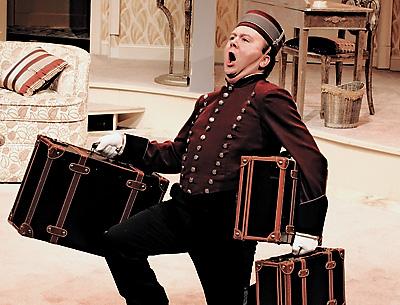Opinion: The Right ‘Tenor’

A summer stock standard has come to the Main Stage at the Bay Street Theatre, and if the quality of this production of the farcical sex comedy “Lend Me a Tenor” is a sign of things to come for Bay Street’s three-play 2013 season, buying a season subscription might be a good ticket to ride this year.
After a 2012 season that included an Americanized version of Geraldine Aron’s “My Brilliant Divorce,” starring Polly Draper, that never quite clicked for me and an updated revival of “Men’s Lives” by Joe Pintauro that played mostly like musty agitprop, it was with some trepidation that I headed to Sag Harbor Saturday night.
But once the lights went down in the house and up on the beautiful, sturdy (and sturdy is important here) set designed by Ken Goldstein, I found myself laughing, and laughing is good.
The play has an interesting history. Written by Fred Ludwig early in his career, it debuted at the American Stage Festival in New Hampshire in 1985, then titled “Opera Buffa.” The play came to the attention of the English director David Gilmore, who mounted it at the Globe Theater in London’s West End, produced by Andrew Lloyd Webber, in 1986. It ran for almost a year before being staged on Broadway by Jerry Zaks in 1989.
“Lend Me a Tenor” is set in a Cleveland hotel room in 1934. A benefit performance for the Cleveland Opera by the great Italian tenor Tito Merelli, also known as Il Stupendo, played by Roland Rusinek, is just hours off. As the lights come up, we find the opera producer’s daughter, Maggie, played winningly by Betsy DeLellio, moaning over the idea of meeting the great tenor. She is joined by Max, the producer’s flunky, played by the talented Noah Plomgren. Max has eyes for Maggie, but it is an unrequited vision.
Maggie describes her one fleeting meeting with Merelli, when she was with her father in Europe.
“He kissed my palm,” she says.
“So what?” Max asks.
“It was romantic.”
“He’s Italian,” Max snaps. “They kiss everything.” And off we go, for “A Day at the Races,” or perhaps a more apt Marx Brothers analogy would be, “A Night at the Opera.”
Where is Merelli? becomes the question, as the producer, Saunders, played by Steve Rosen, enters.
Stella Adler, one of the seminal actors and acting teachers of the 20th century, used to tell her students that sex appeal was not something you can act. Or, as another theatrical icon, Stephen Sondheim, put it in “Gypsy”: “You either got it, or you ain’t. And, boys, I got it.”
Farce is the same way: You either got it, or you ain’t, and Steve Rosen, while he might not have the sex appeal, sure has got it with farce. His performance in “Lend Me a Tenor” is nuanced. He knows how to play the audience, milking the laughs, but keeping enough held back that he is always in control.
He finds, and shares with us, the quiet moments in the material, which, when well-mined, can explode into laughter. He manages, for the most part, to keep the ham in the can, always important, while being totally outrageous. He is also physically very adroit.
His character, Saunders, drives the show in the first act, and when Mr. Rosen’s Saunders is off the stage, you miss him. It is the part that won Philip Bosco a Tony Award for best performance in a play in 1989.
The production is deftly staged by Don Stephenson, who just directed the same play at Paper Mill Playhouse in Millburn, N.J. Mr. Stephenson wisely brought three of his players from that production along for the ride, talented comediennes, all: Nancy Johnston as Julia, Donna English, who plays Diana, and the delightful Judy Blazer, who plays the great tenor’s emotional, jealous wife.
Ms. Blazer dons a silly Italian accent with ease, as if she was born with it.
The show actually starts before it starts, with the standard warning by an unseen, offstage voice, to the audience about cellphones, recording devices, etc. This is done by Ms. Blazer, in character, in broken English, occasionally lapsing into Italian. She concludes by warning the audience about the consequences of violating these rules: “We weel keel you.”
Of course, one of the dangers of being too playful with that standard warning is that some knucklehead in the audience won’t get the very real message, more important than ever in our wireless world, but it is well worth the tradeoff.
Mr. Rusinek also is at ease with that accent, has a good understanding of farce, and is quite adept at finding the humor in Il Stupendo’s tragic flaws, of which there are many.
He has a fine voice, and shares a duet with Mr. Plomgren, who matches him note for note.
Scott Cote is quite funny as the Il Stupendo-obsessed bellboy.
Mr. Plomgren is a young actor, and is up for the challenging role. There were a couple of times in the first act where I heard, for a moment, Woody Allen. Nothing wrong with that. Woody Allen himself has said in the past that, as a young performer, he channeled, in part, Bob Hope. Or, maybe that Woody Allen sound I heard is a product of the language itself.
I do think Mr. Plomgren’s performance will grow over the next few weeks, as he relaxes into the part. Occasionally, I thought he pushed for the laugh instead of trusting that the laugh would come.
Where the first act is plot-driven, the second is sex-driven, with precise door slams, and imprecise mountings and dismountings, all adding to the general feel of joyful anarchy.
The costume design by Wade Laboissonniere captures the era while allowing for the quick changes and disrobings necessary in a sex comedy farce.
The first act is too long for my liking, at least for summer theater. At intermission, the woman sitting behind me in the next-to-last row told her friends that she thought the first act was funny, but “It was too long. Or maybe it was a little too much sun and a little too much wine.”
Indeed. It’s summertime. People are relaxing and easily distracted. If you’re going to give them froth, keep it frothy, then, get off the stage.
Of course, contributing to the occasionally lugubrious moment of the first act Saturday night was the fact that it was opening night for the season, with wine being served beforehand and the standard welcoming speech by the theater’s executive director, Tracey Mitchell. Ms. Mitchell, with her board and her producers, have charted a very different season for Bay Street, with Charles Ludlam’s Theater of the Ridiculous’s “Irma Vep” up next, followed by Mr. Sondheim’s “A Funny Thing Happened on the Way to the Forum.”
All this is well and good, but this is a play that must start as close as possible to its scheduled time, with an intermission as short as possible, neither of which will happen during an opening night gala.
Farce, well done, feels like chaos, but is, in fact, like a fine Swiss watch. Just down the road from the former Bulova watch factory, Mr. Stephenson has built such a mechanism at Bay Street, with precise timing and sharp pacing. Now, just wind it up and let it go.
“Lend Me a Tenor” runs through June 23, with performances Tuesday through Saturday at 8, Sunday at 7, and matinees Wednesdays at 2, and Saturdays at 4 p.m.


